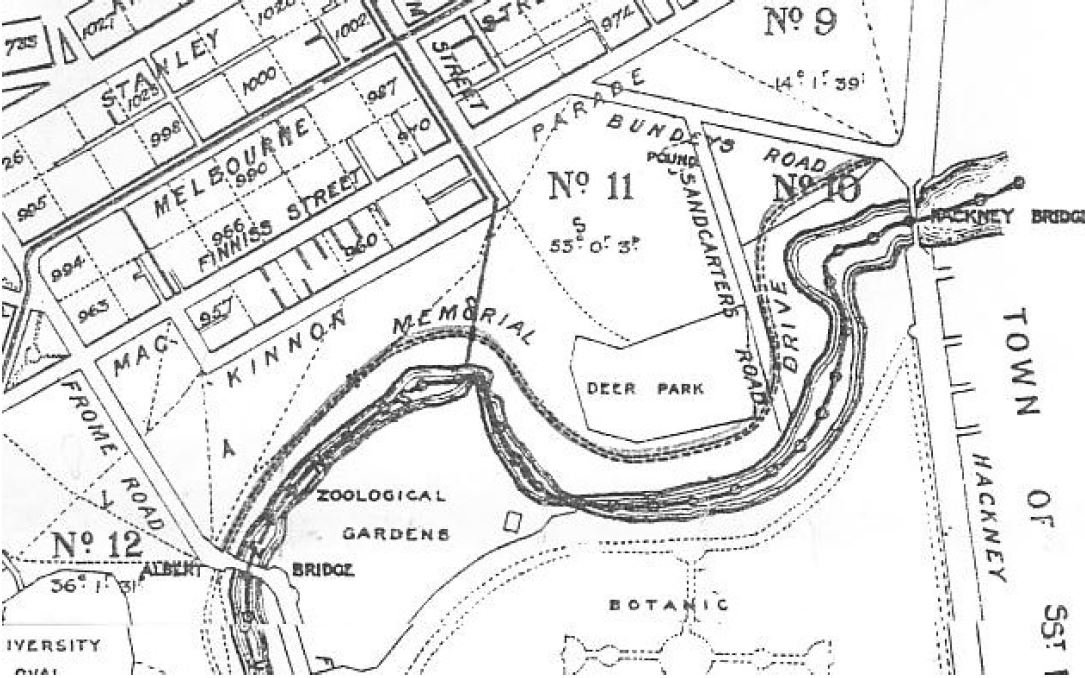by Rhia Daniel
Archery is woven into the foundation of Adelaide.
The city’s 1837 surveyor, Colonel William Light, was an avid archer, and brought with him two longbows and many sets of arrows.
Members of the Adelaide Archery Club practise their sport in Bullrush Park / Warnpangga (Park 10), in the northeast corner of your Park Lands, that Colonel Light designed.
Club members have been using these grounds for at least 70 years, interweaving their own history into the space.
I spoke to the club’s Annette Humphries, to find out more about the entwined past of Adelaide and archery, and what the future holds for the club.
Adelaide Archery Club 1870. Pic: State Library of SA.
Where did the club practise before moving to Park 10?
Annette Humphries.
There is no record of the activity of the Adelaide Archers until about 1850 when the club was quite active. The archives carry a number of references to the club in those early days, including the original plans of Adelaide setting aside a portion of the land for an area for archery.
Archery had its ups and downs, and war, in particular, brought about a break in the sequence of club activities. In 1939, Captain Colin Duncan gathered together interested parties to bring back formal archery to Adelaide, and in August 1940, the first meet of the Archery Club of South Australia was held.
This club went into recess in 1942 during World War Two. Captain Duncan (later Major) is remembered annually at the club with a clout tournament held in his honour.
In 1944, Alex Barter, with a small group from the northern region, and Bill Bowden, from a munitions’ factory, got together to shoot under the name of the Adelaide Archery Club.
Archers in action. Photo: Rhia Daniel.
The Archery Club of South Australia reformed after the war and the two clubs held regular competition until, in August 1946, the two clubs united and held their first shoot as a combined club under the name of the Archery Society of South Australia.
After shooting for many years at the [former] “Koala Farm” [in Park 12 between Sir Edwin Smith Avenue and Frome Road] they moved to [what was then referred to as] “Deer Park” –[now the location of the City of Adelaide Green Waste Recycling Centre in Bullrush Park / Warnpangga (Park 10).]
1927 map showing the location of “Deer Park” in Park 10.
Today, the Archery Society of South Australia is the state body of all archery clubs in South Australia, which are affiliated with Archery Australia. The original club’s name has reverted to Adelaide Archery Club.
The Adelaide Archery Club has been noteworthy for producing champions [in] Australian, Olympic and World Championship team members – such as Simon Fairweather and David Barnes.
The club has been responsible for founding or assisting to establish a large number of metropolitan and country clubs. It is a club that holds together with the common aims of enjoying and furthering the sport of archery.
What makes Park 10 the ideal location for practising archery?
Our members come from all over Adelaide, so the central location is ideal.
The field is oriented, more or less, east/west, which is better than north/south. The cricket/soccer field to the west is large enough for clout (longer distance) shooting, which is very handy.
We are very visible to passing traffic and walkers, which brings our sport to the attention of the public.
Archers in Park 10. Photo: James Elsby.
The Adelaide City Council approved a $100,000 grant in February to improve the club’s facilities. What will this entail?
The grant will contribute to the cost of an extension to the existing premises. As there has been an increase of 35 per cent in membership in the past few years, it urgently needs more storage space.
Safe shooting rules mean that we have to use mobile butts to accommodate additional archers shooting at varying distances. Mobile butts [or targets] need storage space, and currently, we only have room for six.
We also have to keep much more equipment for beginners, and many more target faces. Council requirements and cost increases mean that we must seek additional funding before we can undertake the building works.
Taking aim. Photo: James Elsby.
How did the COVID-19 pandemic affect the archery club?
Pre-COVID membership numbers hovered between about 190 and 210.
This has steadily increased during the COVID and post-COVID years, and now stands at 311.
We have not surveyed new members regarding their reasons for taking up archery, but during COVID, outdoor activities, of this nature, where people could safely take part and maintain physical distancing, may have had some effect.
Also, the fact that travel was restricted meant that everyone looked for activities closer to home. The junior club has benefited from an expanded program, better training, and more parent involvement – all the result of a dedicated junior coordinator.
The club is closely aligned with Pulteney Grammar school. Are there any plans to involve other schools around Adelaide?
We have had enquiries from two or three other schools, but we are limited by the number of volunteer coaching assistants available. A program, such as Pulteney Grammar School’s, requires about eight volunteers to commit to two hours a week, for eight weeks.
This is in addition to the six volunteers needed for each of the eight three-week beginners’ courses for adults, as well as those needed for the junior beginners’ courses.
Furthermore, the coaching coordinator is already extended to full capacity. The consensus at a general meeting was that more schools’ programs would place undue pressure on volunteer coaches and coaching assistants.
What opportunities does archery provide for young people?
Young club member Casey Isles, who recently competed in the World Youth Championships in Ireland. Photo: Graham Winston.
Archery is a fabulous sport for young people. It offers the opportunity for the development of individual skills at the young person’s own pace, as well as tournaments at club, state, national and international levels for those who like to be competitive.
In addition, there are state and national teams, which encourage team spirit and all the benefits of learning to work with others.
The Adelaide Archery Club offers coaching by trained volunteers and also contributes to the operation of the state team. The camaraderie among youngsters, who have shot together for many years, is very noticeable, whether or not they are competitive.
It is also likely that children, who may have learning or behavioural difficulties in other areas, can enjoy this sport, and through it, improve their lives in other fields.
Arrows being collected by archers. Photo: James Elsby.
How does the club care for this part of the Adelaide Park Lands?
The Adelaide Archery Club is well aware of its responsibility as a user of public Park Lands. The grounds we use are kept in the best possible condition, with regular mowing, watering, feeding and weed control, and rubbish is picked up.
Improvements have been made to areas around the butts to minimise wear and the fence behind the butts is kept in good repair and painted when needed.
Warning flags and safety signs are put out when the field is in use, but it is accessible to the public at all other times.
The exterior of the clubrooms is also kept in good repair and painted when needed. It is an unobtrusive building that sits quietly in the corner of the park and does not interfere in any way with people’s enjoyment of the area.
Rhia Daniel has moved to Adelaide from Kapunda, and deeply values community and green spaces.












